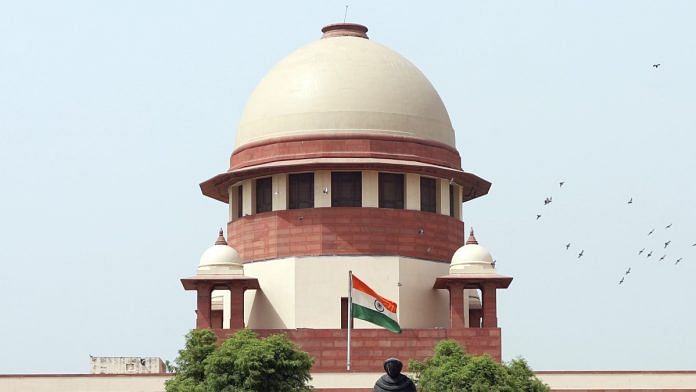New Delhi: Setting aside the concurrent findings of two subordinate courts that had sentenced a man to death in 2011 for the alleged murder of his wife and four children, the Supreme Court last week lamented the “below average” legal assistance given to him in both forums.
A bench led by Chief Justice U U Lalit raised serious questions about the competence of the defence lawyer provided by the government to the accused, and the abysmal quality of the free legal aid afforded to him by the legal services authority.
The apex court noted discrepancies in the way the defence counsel had conducted the trial and observed that the lawyer’s “cross-examination of each and every witness [was] below average”. The questions were “put forward without understanding the legal implications of the answers to such questions”, the court said.
The bench then not only set aside the death penalty given to the man, but also acquitted him of the murder charges.
In its acquittal order, the bench described the case as one of the “most perfunctory investigations”.
According to the prosecution narrative, the accused Ramanand had, on the intervening night of 21 and 22 January 2011, killed his wife and four children with the motive of clearing the way for his extra-marital affair, and subsequently set them on fire.
He was arrested days later, on 24 January. The trial court convicted him after observing the evidence on record. His appeal was rejected by the Allahabad High Court, which confirmed his death sentence in 2016.
Ramanand then moved the top court, claiming he was innocent.
Since he could not afford a private counsel, he was provided free legal aid, both in the trial court as well as the HC, under Article 39A of the Constitution and according to the Code of Criminal Procedure (CrPC). The two provisions empower an accused to assert his/her right to defence at the government’s expense. This to ensure that opportunities for securing justice are not denied to any citizen due to economic or other disabilities.
Also read: How a case of Jehovah’s Witnesses refusing to sing national anthem guided judge’s hijab opinion
The ‘failure’ of the defence counsel
After examining and appreciating the police evidence, as well as the trial held in the case, the bench voiced its dissatisfaction over the quality of legal representation given to Ramanand. The lower court records left the bench “alarmed”, as it noticed the “below average cross-examination of each and every witness”.
The cross-examination, the court said, reflected the failure of the defence counsel to understand that any statement made on his suggestions would be binding on the accused. This meant that whatever questions were asked by the defence counsel, the answers to such questions by the witnesses would bind the accused and directly affect his defence.
“Any defence counsel with a reasonable standing at the Bar is expected to know that cross-examination is not the only method of discrediting a witness,” the court said.
‘Unequal defence’
It is the duty of the courts to ensure that an accused is provided “appropriate and meaningful legal aid at the expense of the state” in case, owing to “indigence, poverty or illiteracy”, one is unable to engage a lawyer.
Such representation, however, must not only be “for namesake”. Under the Constitution, the presence of a counsel must mean “effective, genuine, and faithful presence and not a mere farcical, sham, or virtual presence,” the court said.
“Threshold level of competence and due diligence in the discharge of duties as a defence counsel would certainly be the constitutional guaranteed expectation,” it noted.
The bench also referred to a 1974 case to reiterate that the appointment of defence counsels in such grave cases must be viewed with “appropriate seriousness”. Competent advocates who can deal with complex cases must thus be appointed in such cases.
“It is desirable that in such cases, [a] senior advocate practising in the trial court shall be requested to conduct the case himself or herself on behalf of the undefended accused or at least provide good guidance…,” the court added.
The bench used the Ramanand case to remind all district and sessions judges to ensure that an accused gets competent and quality legal representation. Having younger members of the Bar as defence counsel could lead to “unequal defence”, and experienced members of the Bar must be inducted where necessary, it said, referring to the rules of the National Legal Services Authority, which state that a senior advocate may be engaged as a legal aid defence counsel.
In SC, Ramanand received legal assistance from Project 39A, a criminal justice project of the National Law University, Delhi. Senior advocate S. Niranjan Reddy argued on behalf of the project in the apex court, which led to Ramanand’s acquittal.
The Supreme Court said that none of the pieces of evidence in the case connected Ramanand to the crime and that the motive given by the police was not enough to punish him. Allowing his appeal, the court held that the fundamental presumption in criminal law is that the accused remains innocent, until proven guilty.
Even where “the offence is gruesome and revolts human conscience”, the accused can be punished only when every other hypothesis has been ruled out.
What ‘may’ be true and what ‘must’ be true is a long distance to travel, the court said.
(Edited by Zinnia Ray Chaudhuri)
Also read: ‘POCSO a secular law, applies to all’: How NCPCR opposed marriage of 16-yr-old Muslim girl in SC






